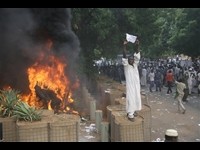(AP) Sudan: Protesters try to climb US Embassy wall
By AYA BATRAWY and LEE KEATH
Associated Press
CAIRO
Witnesses say Sudanese police have opened fire on protesters trying to climb the walls of the U.S. Embassy in Khartoum.
The witnesses say several thousands of Sudanese were protesting outside the embassy, trying to storm it in anger over an obscure file produced in the United States that denigrated the Prophet Muhammad.
It was not immediately clear if any protesters got into the embassy.
The witnesses said at least three protesters were hurt, seen motionless on the ground. There was no immediate confirmation whether they were dead.
The attack came as protests against the film spread around the Middle East and other Muslim countries, from Tunisia to Pakistan.
THIS IS A BREAKING NEWS UPDATE. Check back soon for further information. AP’s earlier story is below.
Angry demonstrations against an anti-Islam film spread to their widest extent yet around the Middle East and other Muslim countries Friday, as protesters smashed into the German Embassy in the Sudanese capital and security forces in Egypt and Yemen fired tear gas and clashed with protesters to keep them away from U.S. embassies.
One protester was killed in the northern Lebanese city of Tripoli in clashes with security forces, after a crowd of protesters set fire to a KFC and an Arby’s restaurant. Protesters hurled stones and glass at police in a furious melee that left 25 people wounded, 18 of them police.
Protests were held in cities from Egypt to Pakistan after weekly Friday Muslim prayers, where many clerics in their mosques sermons denounced an obscure movie produced in the United States that denigrated the Prophet Muhammad. The spread of protests comes after attacks earlier this week on the U.S. Embassies in Cairo and the Yemeni capital Sanaa and on a U.S. consulate in Libya, where the ambassador and three other Americans were killed.
After security forces earlier this week stood aside in the face of protesters, Yemen and Egypt made efforts Friday to contain them. In an apparent attempt to patch up strained ties with the United States, Egypt’s Islamist president, Mohammed Morsi, went on state TV and urged Muslims to protect foreign diplomatic missions _ his most direct public move to contain protests.
In Sudan, a prominent sheik on state radio urged protesters to march on the German Embassy to protest alleged anti-Muslim graffiti on mosques in Berlin and then to the U.S. Embassy to protest the film.
Soon after, several hundred Sudanese stormed into the German Embassy, burning a car parked behind its gates and setting fire to trash cans. Protesters danced and celebrated around the burning barrels as palls of black smoke billowed into the sky.
Police firing tear gas drove the protesters out of the compound. Some then began to demonstrate outside the neighboring British Embassy, shouting slogans, while others left, apparently heading to the American Embassy, which is outside of the capital.
In east Jerusalem, Israeli police stopped a crowd of around 400 Palestinians from marching on the U.S. consulate to protest the film. Demonstrators threw bottles and stones at police, who responded by firing stun grenades. Four protesters were arrested.
Security forces in Yemen shot live rounds in the air and fired tear gas at a crowd of around 2,000 protesters trying to march to the U.S. Embassy in the capital, Sanaa. Though outnumbered by protesters, security forces were able to keep the crowd about a block away from the mission.
A day earlier, hundreds of protesters chanting “death to America” stormed the embassy compound in Sanaa and burned the American flag. The embassy said nobody was harmed. Yemen’s president, Abed Rabbo Mansour Hadi, quickly apologized to the United States and vowed to track down the culprits.
In Egypt, several hundred protesters massed in Cairo’s Tahrir Square after weekly Muslim Friday prayers and tore up an American flag, waving a black, Islamist flag.
A firebrand ultraconservative Salafi cleric blasted the film and in his sermon in Cairo’s Tahrir Square said it was upon Muslims to defend Islam and its prophet.
Many in the crowd then moved to join protesters who have been clashing for several days with police between Tahrir and the U.S. Embassy. “With our soul, our blood, we will avenge you, our Prophet,” they chanted as police fired volleys of tear gas.
Ahead of the clashes, the president spoke for more than seven minutes on state TV, saying, “It is required by our religion to protect our guests and their homes and places of work.”
He denounced the killing of the American ambassador in Libya. “This is something we reject and Islam rejects. To God, the attack on a person to Allah is bigger an attack on the Kaaba,” he said, referring to Islam’s holiest site in Mecca.
His own Muslim Brotherhood group called for peaceful protests in Tahrir to denounce the film.
The movie, called “Innocence of Muslims,” ridicules the Prophet Muhammad, portraying him as a fraud, a womanizer and a child molester.
A small, peaceful demonstration was held Friday outside the U.S. Embassy in the Malaysian capital, Kuala Lumpur.
Additional reporting by Esam Mohamed in Tripoli, Ahmed Al-Haj in Sanaa, Yemen, Mohamed Osman in Khartoum, Elizabeth A. Kennedy in Beirut, Daniel Estrin in Jerusalem and Niniek Karmini in Jakarta, Indonesia.
Lebanese officials: 1 killed, 25 wounded during protest over anti-Islam film.

COMMENTS
Please let us know if you're having issues with commenting.